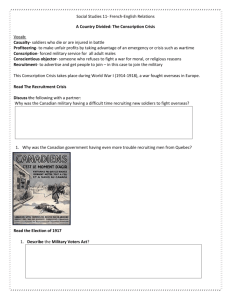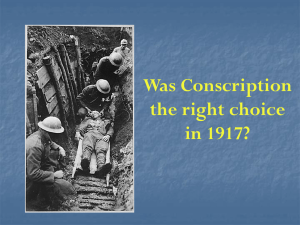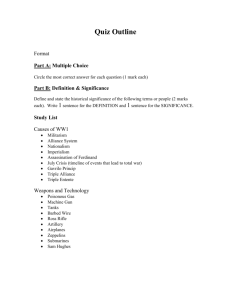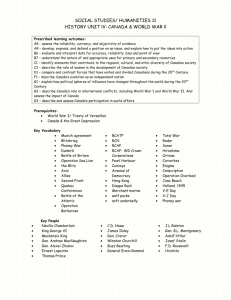Conscription paragraph - St. Mary Catholic Secondary School
advertisement
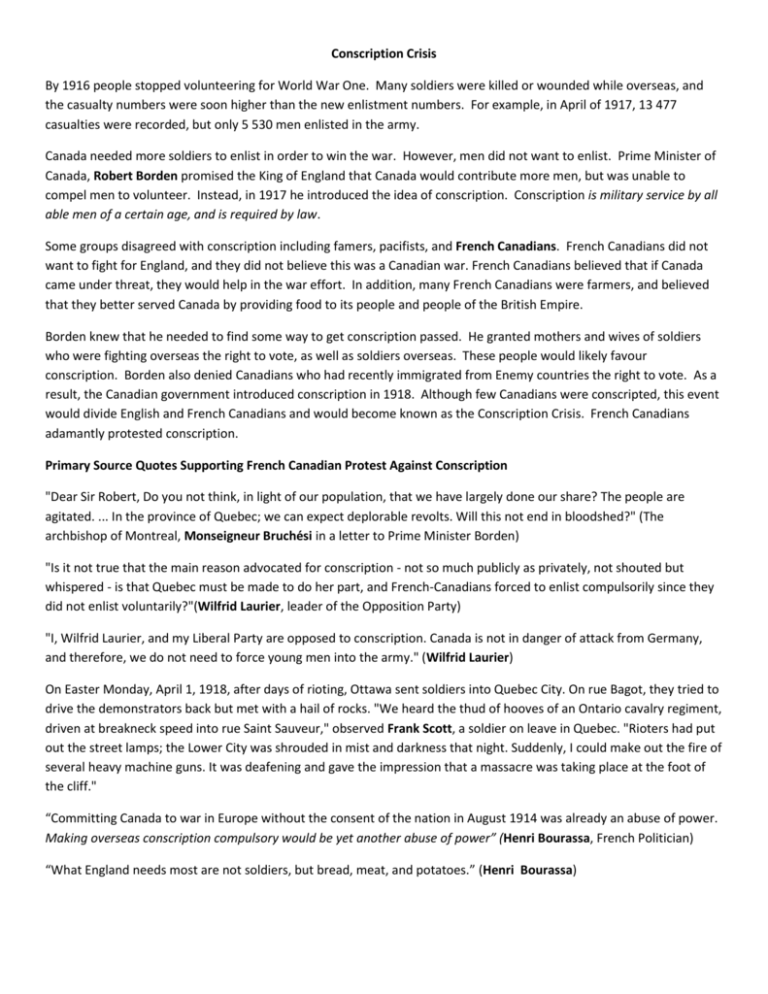
Conscription Crisis By 1916 people stopped volunteering for World War One. Many soldiers were killed or wounded while overseas, and the casualty numbers were soon higher than the new enlistment numbers. For example, in April of 1917, 13 477 casualties were recorded, but only 5 530 men enlisted in the army. Canada needed more soldiers to enlist in order to win the war. However, men did not want to enlist. Prime Minister of Canada, Robert Borden promised the King of England that Canada would contribute more men, but was unable to compel men to volunteer. Instead, in 1917 he introduced the idea of conscription. Conscription is military service by all able men of a certain age, and is required by law. Some groups disagreed with conscription including famers, pacifists, and French Canadians. French Canadians did not want to fight for England, and they did not believe this was a Canadian war. French Canadians believed that if Canada came under threat, they would help in the war effort. In addition, many French Canadians were farmers, and believed that they better served Canada by providing food to its people and people of the British Empire. Borden knew that he needed to find some way to get conscription passed. He granted mothers and wives of soldiers who were fighting overseas the right to vote, as well as soldiers overseas. These people would likely favour conscription. Borden also denied Canadians who had recently immigrated from Enemy countries the right to vote. As a result, the Canadian government introduced conscription in 1918. Although few Canadians were conscripted, this event would divide English and French Canadians and would become known as the Conscription Crisis. French Canadians adamantly protested conscription. Primary Source Quotes Supporting French Canadian Protest Against Conscription "Dear Sir Robert, Do you not think, in light of our population, that we have largely done our share? The people are agitated. ... In the province of Quebec; we can expect deplorable revolts. Will this not end in bloodshed?" (The archbishop of Montreal, Monseigneur Bruchési in a letter to Prime Minister Borden) "Is it not true that the main reason advocated for conscription - not so much publicly as privately, not shouted but whispered - is that Quebec must be made to do her part, and French-Canadians forced to enlist compulsorily since they did not enlist voluntarily?"(Wilfrid Laurier, leader of the Opposition Party) "I, Wilfrid Laurier, and my Liberal Party are opposed to conscription. Canada is not in danger of attack from Germany, and therefore, we do not need to force young men into the army." (Wilfrid Laurier) On Easter Monday, April 1, 1918, after days of rioting, Ottawa sent soldiers into Quebec City. On rue Bagot, they tried to drive the demonstrators back but met with a hail of rocks. "We heard the thud of hooves of an Ontario cavalry regiment, driven at breakneck speed into rue Saint Sauveur," observed Frank Scott, a soldier on leave in Quebec. "Rioters had put out the street lamps; the Lower City was shrouded in mist and darkness that night. Suddenly, I could make out the fire of several heavy machine guns. It was deafening and gave the impression that a massacre was taking place at the foot of the cliff." “Committing Canada to war in Europe without the consent of the nation in August 1914 was already an abuse of power. Making overseas conscription compulsory would be yet another abuse of power” (Henri Bourassa, French Politician) “What England needs most are not soldiers, but bread, meat, and potatoes.” (Henri Bourassa) You will be writing an argumentative paragraph that supports French Canadian rejection of Conscription. In your paragraph you will have a topic sentence, supporting evidence, a primary source quote and a concluding sentence. You will avoid “personalization” (ie using “I” “we” “my” etc) Topic Sentence. Introduce your argument in an interesting way._________________________________________________________ ________________________________________________________________________________________________ ________________________________________________________________________________________________ Supporting Evidence: ______________________________________________________________________ _________________________________________________________________________________________ _________________________________________________________________________________________ _________________________________________________________________________________________ Primary Source Quote Introduce the Quote, including the person’s name and position __________________________________________________________________________________________ __________________________________________________________________________________________ Quote(copy directly as it is written): “_________________________________________________________________________________________ __________________________________________________________________________________________ __________________________________________________________________________________________ _________________________________________________________________________________________” How this quote supports your argument: __________________________________________________________________________________________ __________________________________________________________________________________________ __________________________________________________________________________________________ __________________________________________________________________________________________ Other Supporting evidence in sentence form. Include other evidence that supports your argument. Include secondary source evidence. __________________________________________________________________________________________ __________________________________________________________________________________________ __________________________________________________________________________________________ __________________________________________________________________________________________ __________________________________________________________________________________________ __________________________________________________________________________________________ __________________________________________________________________________________________ Concluding Sentence: (remind reading what you are arguing in the first place!) __________________________________________________________________________________________ __________________________________________________________________________________________ __________________________________________________________________________________________ __________________ ______________________________________________________________________________ This is a rough copy and is due at the end of the period. I will review each rough copy and provide suggestions and comments. A good copy will be typed and submitted on:_______________________________________________
